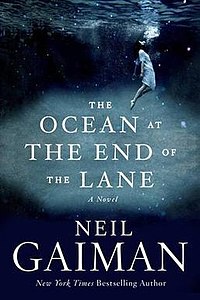 Neil Gaiman has written many fantastical books for children and adults, all of which reveal his brilliant and twisted imagination. His stories are always tinged with darkness (the adult books are much more than tinged) yet I always found a good dose of humor lurking in those pages as well. However, his latest novel, The Ocean at the End of the Lane, is a slim book that is packed with a multitude of macabre events. Despite the protagonist being seven years old for most of the story, this is emphatically a book for adults, or some gothic young adults.
Neil Gaiman has written many fantastical books for children and adults, all of which reveal his brilliant and twisted imagination. His stories are always tinged with darkness (the adult books are much more than tinged) yet I always found a good dose of humor lurking in those pages as well. However, his latest novel, The Ocean at the End of the Lane, is a slim book that is packed with a multitude of macabre events. Despite the protagonist being seven years old for most of the story, this is emphatically a book for adults, or some gothic young adults.
The novel relates the story of an unnamed man who has returned to his childhood town for a funeral and proceeds to look for a farmhouse at the end of the lane he grew up on. He has vague memories about the Hempstock women who lived in the farmhouse, and the young Lettie Hempstock who was maybe a friend. Once he gets to the farm, he sits by the pond behind the house, and remembers that Lettie used to call it the "ocean." And with that, he is whisked away to his memories of being seven years old, when a South African opal miner came to stay with his family, committed suicide, and created a portal for a malevolent spirit to enter this world and terrorize him until the Hempstocks intervened. Bet you didn't see that coming.
I won't delve into more detail - suffice to say, each scene is vividly described and there are some horrifying details that made my skin crawl. Gaiman is a master at turning the irrational fears of childhood into completely rational fears that are all the more frightening because the adults just don't understand. The protagonist is cruelly dealt with, but thanks to twelve-year-old Lettie, her mother, and her grandmother of indeterminate age, he is able to tackle the terrors of childhood, though they leave a lasting impression.
The Ocean at the End of the Lane is not a feel-good novel, but it certainly will make you feel something. It is fascinating and frightening, disturbing and delightful. I'm not sure I would return to it like I do to Gaiman's other works, because it's too unrelentingly dark. However, it is well worth reading once, just so you can uncomfortably revel in Gaiman's ability to frighten you with a few short sentences. Isn't that was great literature is all about?
No comments:
Post a Comment